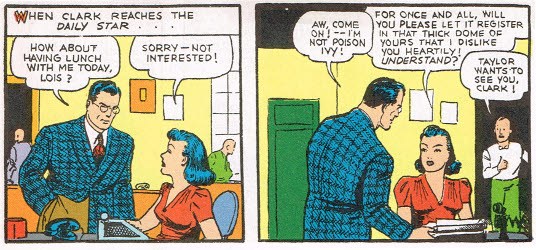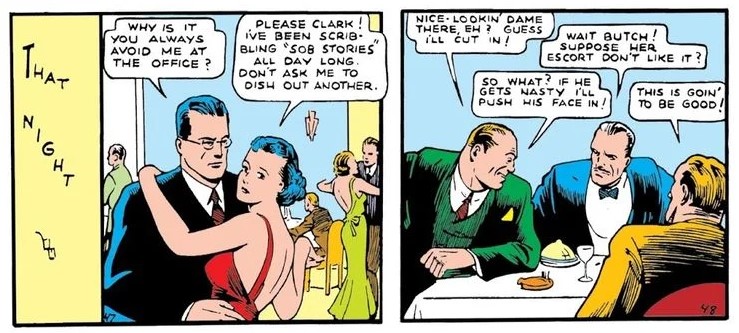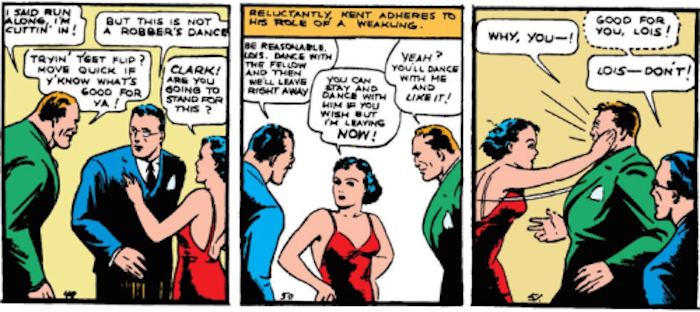The Love Life of Superman
Andrew Klavan quotes a Larry Niven article, and makes a few observations about the love life of Superman.
My comment:
Mr. Klavan complains that Superhero movies do not deal with Love and Death, Eros and Thanos, and then uses, as his example, a scene from the second Superman movie that contradicts his point.
In this scene, the superhuman becomes mortal — that is, accepts humanity and hence accepts death — in order to wed his true love — that is, for sex. He is willing to die for love.
The moral of the movie reverses this choice once Superman learns duty to serve mankind is greater than love or death. Note that the first movie argued the opposite point. When Lois Lane dies a grisly and protracted death, literally being buried alive, figuratively being put in her grave, Superman defies his heavenly father, literally seen as a giant face in the sky forbidding him from changing human history, figuratively forbidding him to change fate, and, as in many a myth involving Hercules in the Underworld, the superhuman disobeys cruel fate to bring the maiden free from death, because he loves her — showing that love is stronger than death.
Outside these movies, from their very beginning, Superman has always been about two themes: the first theme is the two-sided love triangle between Clark Kent, the meek and mild-mannered farm-bred boy literally from Smallville, Lois Lane the spunky and attractive big-city reporter girl, and Superman, who is dressed like a Circus strongman, complete with cape and tights.
Clark loves Lois who loves Superman, but Clark is Superman. She loves his inner self, in other words, what is is beneath his coat, but hates his outward self. We all know the myth.
For myth it is. To say this is not about Love and Death is as foolish as saying that the story of the Beauty and the Beast is not about Love and Death. In that story, the Beast must die, for death is an act of total surrender even as love is, in order for his true self as a prince to emerge.
In this story, Lois spends all the Silver Age of comics trying to discover Superman’s secret identity and trapping him into marriage. Every woman in love, every woman being wooed, must find the insight to read the heart of her suitor, and see what his inner self really is. To find a hero beneath a mild mannered exterior touches a central truth of the female condition.
Likewise, every shy boy who wants to find a hero’s heart hidden beneath his shirt when he rips it open, Superman is a nearly perfect image of the human condition, or, at least, of boyish daydream.
On a deeper level, the image of Clark Kent tearing open his shirt to display the red S and shield of his heraldry, reminds the faithful of the day when the mortal clay will perish, and the immortal underneath comes free.
There is one other aspect of Superman’s secret identity when my youngest son once pointed out to me, namely, that no one knows Superman has one.
Imagine you lived in the superhero world. Everyone knows Batman has a secret identity, for he covers his face in a cowl, and disappears during the day. But Superman? He wears no mask, and everyone knows he lives in his Fortress of Solitude at the North Pole.
No one, not even Lex Luther, world’s smartest man, would suspect, or would be willing to believe that a man faster than a speeding bullet spends his mornings during rush hour trapped in the Holland Tunnel, surrounding by motionless, honking cars, on his commute to and from the Daily Planet building.
And, for the record, before anyone claims that Clark Kent wearing glasses would not fool anyone, keep in mind that Elvis Presley once lost an Elvis impersonation contest, Charlie Chaplin lost a Chaplin lookalike contest, and Dolly Parton was dismissed from a Dolly Parton lookalike contest because she was too short, and a drag queen won the prize.
The word and the idea of the superman or ubermensch comes from Nietzsche, whose proposed a crackpot Darwin theory that, even as man supersedes ape, the superman will supersede man, once we all throw off the restrictions of Christian morality and sleep with whores. The Superman of Nietzsche is the epitome of satanic pride.
In American, the Jewish sons of immigrants fleeing the Russian Empire, knew well what a superman really would be, and crafted an American ideal. The American superman is a strange visitor to our shores, but patriotic to the core of his Kansas heart. He fights for truth, justice, and the American Way.
More to the point, fights for truth, justice, and the American Way without asking for a reward.
Superman represents humility. He is a mild-mannered weakling, a bumpkin from rural America. He saves the world from an invasion of robotic moon-apes or whatever, and perhaps gets a ticker tape parade, but then he returns to his overpriced one-room apartment, living on his pay as a reporter, and the girl he loves is in love with someone else. He gets no praise, no medals, and considerable humiliation, as Clark. He is not the king of the world, despite that many cheering crowds would support his claim, and not all the combined armies and navies of the world could defeat him.
But there is one power on earth that can defeat him! Lois Lane:

But he cannot even dance with Lois in her slinky red evening dress without being pushed aside.

He is a weakling.

Clark saves the world, and gets nothing for it. Not even a thank you: because the headlines and monuments offered by grateful nations he saves are all for Superman, his alter ego, not for him.
In other words, each and every day, every mission of heroism, Clark dies to himself, kills his own pride, for the sake of love of the world. The story is indeed about Love and Death, for it is about the sacrifice of erotic love (eros) to divine love (agape).
What the Superman stories are not is film noir. They are not tales of hard boiled realism, Mr. Klavan’s preferred genre. Fair enough. But let us hear no more nonsense about these modern-day myths of Love and Death not treating with the subject matter.
And, for the record, the scene Mr. Klavan shows is from Superman 2 (1980) not from Superman 3 (1983).
